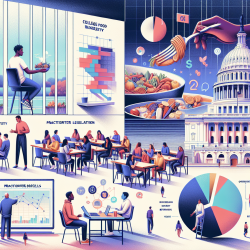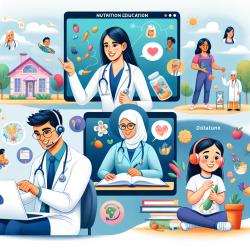Introduction
In the realm of speech-language pathology and educational support, understanding the broader social determinants of health is crucial. A recent study titled Addressing College Food Insecurity: An Assessment of Federal Legislation Before and During Coronavirus Disease-2019 provides valuable insights into the intersection of education, nutrition, and policy. This research is particularly relevant for practitioners who aim to enhance their skills and create better outcomes for children and young adults.
The Research Findings
The study highlights the alarming rates of food insecurity among college students, exacerbated by the COVID-19 pandemic. With unemployment rates soaring and campus resources dwindling, many students face significant challenges in accessing adequate nutrition. The research delves into federal legislative efforts aimed at addressing these issues, revealing that 17 bills were introduced in the 116th legislative session to tackle college food insecurity.
Implications for Practitioners
For practitioners in the field of speech-language pathology, this research underscores the importance of considering the holistic needs of students. Here are some actionable insights:
- Advocacy and Awareness: Practitioners can play a pivotal role in advocating for policy changes that support students' nutritional needs. By staying informed about legislative efforts, practitioners can contribute to discussions and initiatives that promote student well-being.
- Collaboration: Building partnerships with nutritionists, educators, and policymakers can enhance the support network for students. Collaborative efforts can lead to more comprehensive strategies that address both educational and nutritional needs.
- Research and Evaluation: Engaging in or supporting research initiatives that evaluate the impact of food insecurity on educational outcomes can provide valuable data to inform future policies and practices.
Encouraging Further Research
The study also highlights gaps in current research, such as the need for nationally representative estimates of college food insecurity and the development of valid measures for this population. Practitioners are encouraged to explore these areas further, contributing to a deeper understanding of how food insecurity affects educational attainment and health outcomes.
Conclusion
By integrating the findings of this research into their practice, speech-language pathologists and educational support professionals can enhance their ability to create positive outcomes for students. Addressing food insecurity is not just a policy issue; it's a crucial component of supporting students' overall health and academic success.
To read the original research paper, please follow this link: Addressing College Food Insecurity: An Assessment of Federal Legislation Before and During Coronavirus Disease-2019.










